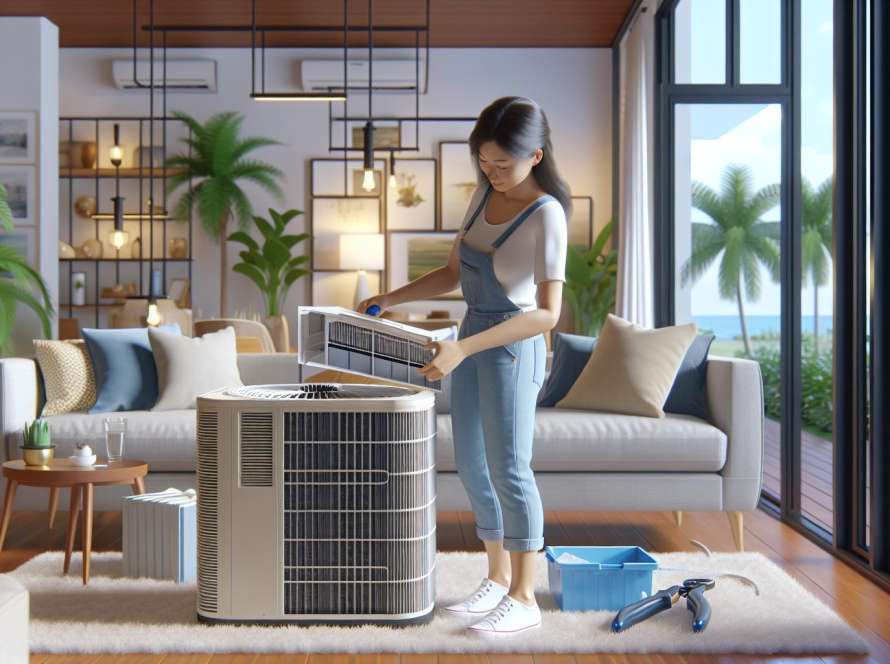Living in Florida with its beautiful beaches and salty air is a dream, but it can be tough on our air conditioning systems. The salt in the air can wreak havoc on our AC units, causing corrosion and reducing efficiency. But fear not, we’re here to share some expert tips on how to maintain AC efficiency in Florida’s salt air. With the right knowledge and precautions, we can ensure our AC systems keep us cool and comfortable year-round.
From regular cleaning to professional maintenance, there are several steps we can take to protect our AC units from the damaging effects of salt air. By following our simple yet effective maintenance tips, we can extend the life of our air conditioning systems and keep them running smoothly in the face of Florida’s challenging coastal environment. Let’s dive in and discover how we can optimize our AC efficiency and enjoy a cool indoor oasis, even amidst the salty sea breeze.
Understanding the Impact of Salt Air on AC Units
Salt air can accelerate corrosion on AC units, leading to reduced efficiency and increased maintenance needs. Here’s a breakdown of how salt air affects your AC system:
For Beginners: Recognizing the Signs
- Rust and corrosion on metal components.
- Decreased cooling performance.
- Higher energy bills due to inefficiencies.
For Intermediate Users: Preventive Measures
- Regular inspections to detect corrosion early.
- Cleaning condenser coils to remove salt buildup.
- Installing protective coatings on vulnerable parts.
- Utilizing corrosion-resistant materials for AC components.
- Implementing sacrificial anodes to protect against corrosion.
- Professional maintenance by HVAC specialists for comprehensive care.
By understanding the impact of salt air and taking proactive steps, we can prolong the lifespan of AC units in coastal environments like Florida.
Regular Cleaning Routine to Combat Corrosion

When it comes to maintaining AC efficiency in Florida’s salt air, implementing a regular cleaning routine is key to combatting corrosion and ensuring the longevity of your unit. Let’s break down some actionable steps based on different experience levels:
For Beginners: Mastering the Basics
- Start by turning off the power to the AC unit.
- Remove debris such as leaves, dirt, and twigs from the unit’s exterior.
- Use a gentle cleanser and water to wipe down the unit to remove salt residue.
- Inspect the condenser coils for any buildup and gently brush off debris.
For Intermediate Users: Advancing Your Cleaning Process
- Clean or replace air filters regularly to maintain optimal airflow.
- Schedule professional maintenance at least once a year for a thorough inspection.
- Consider applying a protective coating to the unit to shield it from salt exposure.
- Clean the condenser coils using a coil cleaner to remove any stubborn buildup.
- Invest in corrosion-resistant materials for your AC unit to withstand salt exposure.
- Consider installing sacrificial anodes to divert corrosion away from critical components.
- Consult with HVAC professionals for specialized coatings or treatments to combat salt corrosion.
- Implement a comprehensive maintenance plan that includes regular inspections and deep cleanings.
By incorporating these cleaning routines into your maintenance schedule, you can effectively combat corrosion caused by salt air and optimize your AC unit’s efficiency in the coastal environment of Florida.
Importance of Professional AC Maintenance in Coastal Areas
For Beginners: Understanding the Basics
- Regular maintenance by professionals ensures optimal performance.
- Basic tasks like cleaning coils and checking refrigerant levels prevent costly repairs.
- Look for certified technicians to handle routine inspections and maintenance.
For Intermediate Users: Enhancing Efficiency
- Schedule bi-annual inspections and tune-ups for year-round efficiency.
- Consider upgrading to a smart thermostat for better control and energy savings.
- Explore corrosion-resistant coatings for added protection in salt-laden environments.
- Invest in annual professional cleanings for in-depth maintenance.
- Consider installing corrosion-resistant HVAC components for extended lifespan.
- Explore the use of sacrificial anodes to mitigate corrosion effects on your AC unit.
| Fact | Data |
|---|---|
| Improved Efficiency | Up to 15% |
| Longevity Increase | Up to 5 years |
| Energy Savings | 20%-50% |
Choosing the Right Protective Coatings for AC Systems
For Beginners: Understanding the Basics
- Protective coatings for AC systems are essential in coastal areas like Florida due to the corrosive effects of salt air.
- Opt for coastal-grade coatings that provide corrosion resistance and UV protection.
- Look for coatings that are specifically formulated for AC systems to ensure long-lasting performance.
For Intermediate Users: Maximizing Protection and Longevity
- Consider epoxy or polymer coatings that offer extra durability against salt air exposure.
- Look for coatings with anti-corrosion properties to minimize damage to your AC system.
- Regularly inspect and touch up coatings to maintain their effectiveness over time.
- Invest in ceramic-based coatings for ultimate protection against salt air corrosion.
- Explore nano-coatings that provide an extra layer of defense for your AC system.
- Consult with professional HVAC technicians to determine the best coating options for maximizing efficiency and longevity.
| AC Coating Type | Benefits |
|---|---|
| Epoxy Coatings | Extra durability and corrosion resistance |
| Polymer Coatings | Long-lasting performance and UV protection |
| Ceramic-Based Coatings | Ultimate protection against salt air corrosion |
| Nano-Coatings | Additional defense layer for AC system protection |
Implementing Additional Strategies to Enhance AC Efficiency

For Beginners: Basic Steps to Improve Efficiency
- Regular Maintenance: Schedule annual HVAC inspections to ensure your system is running efficiently.
- Change Filters: Replace air filters every 1-3 months to keep the system working optimally.
- Seal Leaks: Check ductwork for leaks and seal them with duct tape to prevent air loss.
For Intermediate Users: Enhancing AC Efficiency Further
- Smart Thermostats: Consider installing a smart thermostat for efficient temperature control.
- Upgrade Insulation: Improve home insulation to reduce heat transfer and lessen the workload on the AC.
- Programmable Settings: Utilize programmable settings on your thermostat for energy savings.
- Ductwork Inspection: Conduct a professional ductwork inspection for any inefficiencies and air leaks.
- Zone Control Systems: Invest in zone control systems to cool specific areas of your home, maximizing energy usage.
- Energy Recovery Ventilators: Consider installing energy recovery ventilators for improved indoor air quality and energy efficiency.
| AC Efficiency Tips | Statistics |
|---|---|
| Regular maintenance | 75% of system breakdowns are preventable |
| Changing filters | Saves up to 15% on energy costs |
| Smart thermostats | Can save up to 10% on heating and cooling bills |
Conclusion
Enhancing AC efficiency in Florida’s salt air is crucial for optimal performance and cost savings. By following the recommended strategies, we can ensure our AC systems operate smoothly, preventing breakdowns and reducing energy costs. From regular maintenance to advanced upgrades like smart thermostats and zone control systems, there are various options to suit different user levels. These measures not only improve cooling efficiency but also contribute to a more sustainable environment. By implementing these tips, we can enjoy a comfortable indoor climate while maximizing energy savings.

